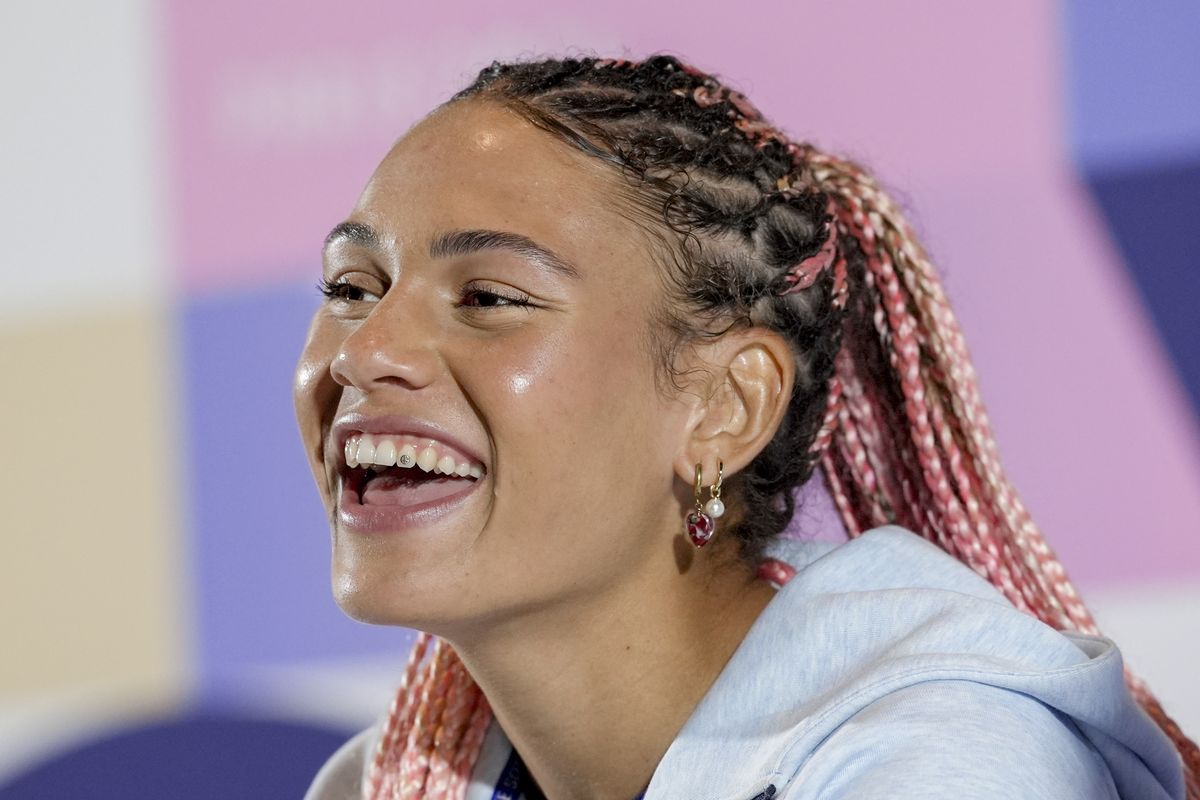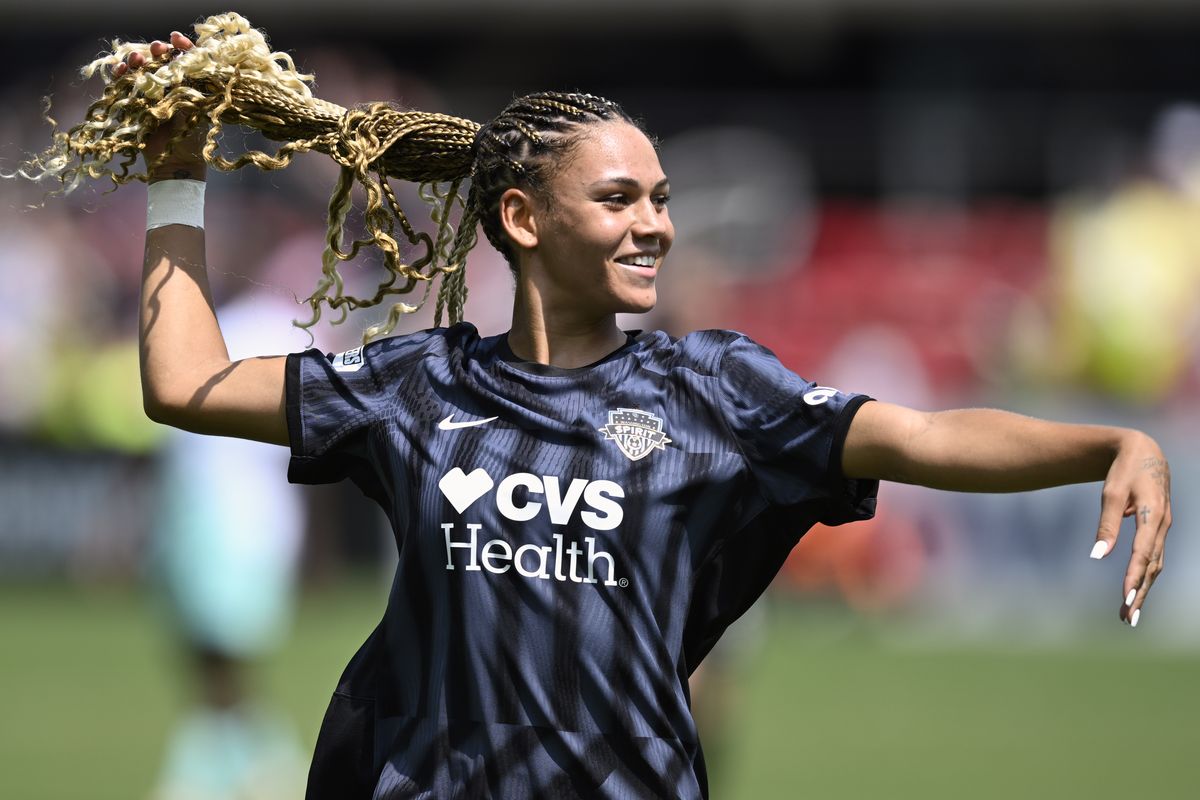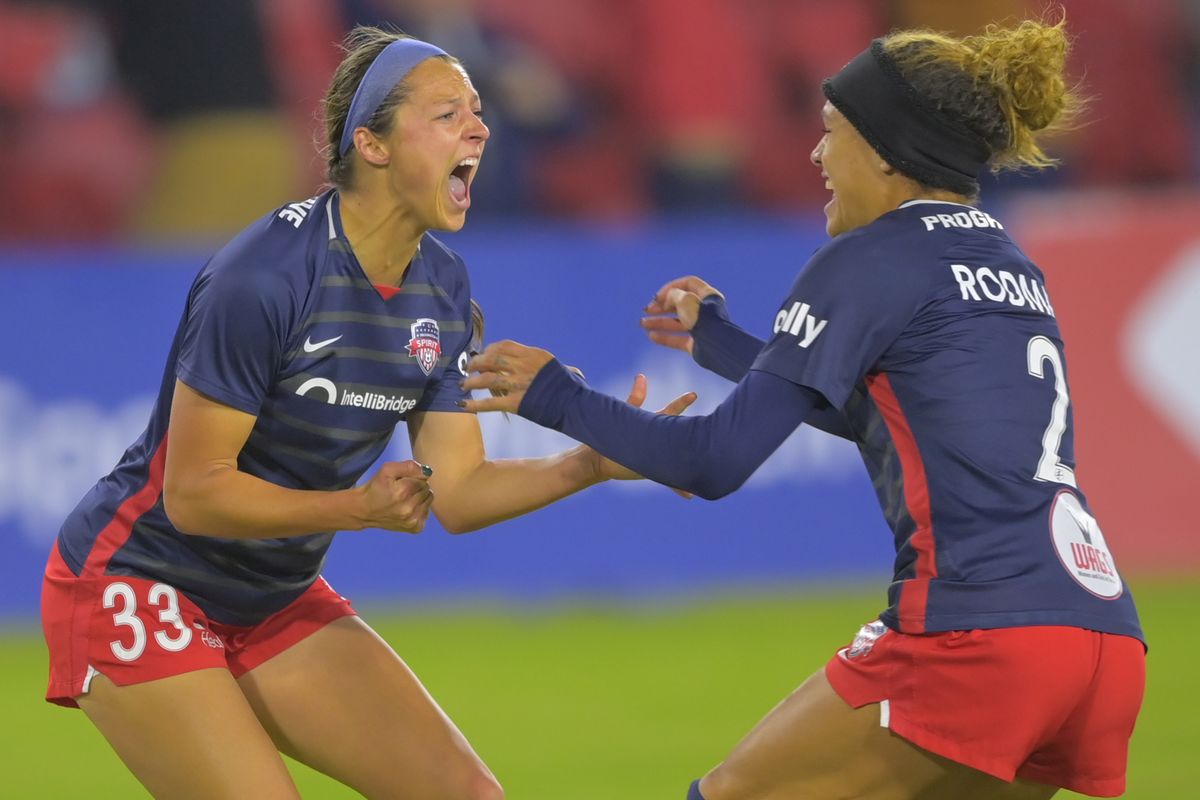Trinity Rodman has learned how to fail. She’s better for it.
After winning an Olympic gold medal with the United States this past summer, Trinity Rodman is seeking an NWSL title with the Washington Spirit. (John McDonnell/for The Washington Post)
Most fans of the U.S. women’s national soccer team swiftly forgot the 105 minutes that preceded the extra time winner that sent the Americans to the Paris Olympic semifinals this past summer. But the player behind that instantly immortalized moment sure hasn’t.
“I was playing horrible,” Trinity Rodman said. “I was turning over things that I would never turn over. My dribbles were so bad. My shots were horrible.”
Until one very much wasn’t. As Crystal Dunn pinged a switch to Rodman on the right flank, the forward corralled the ball, cut inside and curled home a left-footed strike for the only goal of the United States’ 1-0 win over Japan at Parc des Princes. The pace to get behind the back line, the skill to shake her defender, the audacity to take aim at goal, the technical prowess to finish with her weaker foot – it was as if every trait that makes the 22-year-old one of soccer’s most tantalizing talents was synthesized into a 5-second sequence.
“That is going to be embedded and ingrained in the Olympics and the U.S. women’s national team for a long time,” said Rodman, who committed to play soccer at Washington State in 2020, but left when the season was canceled by COVID. “So I don’t dwell on bad performances and bad games anymore, because it just takes one moment.”
For Rodman, those moments are happening quickly now. Since her World Cup debut ended in disappointment 15 months ago, the rising star has accelerated her ascent. This past summer, she started every match and notched three goals as a new-look U.S. squad won Olympic gold. On the club level, the MVP finalist has powered the resurgent Washington Spirit to the NWSL championship game against the Orlando Pride on Saturday night in Kansas City, Missouri. At last month’s Ballon d’Or ceremony, she finished ninth in the voting for women’s world player of the year.
“Seeing her next to these football greats, you get the sense she will win that award one day,” Spirit captain Aubrey Kingsbury said. “It’s incredible to think that she’s not even anywhere near her ceiling.”
Finding her footing
Rodman entered the NWSL carrying outsize expectations. A U.S. youth national team standout, she became the youngest draft pick in league history when she went No. 2 to the Spirit in 2021. Her notable surname – she’s the daughter of Basketball Hall of Famer Dennis Rodman – came with its own weight. As the Southern California native made herself at home in Washington, her vibrant persona quickly matched her burgeoning on-the-field influence.
“Believe it or not, when she first came in, she was kind of a little shy,” Spirit forward Ashley Hatch said. “But I think as soon as she started feeling comfortable, she started showing her true personality and being herself, which is just a fun, goofy, funny person. I feel like that’s a person that every locker room needs.”
From the outside, Rodman – whose brother DJ played four seasons for WSU basketball – seemed to enjoy a steady rise. After earning rookie of the year honors and helping the Spirit claim its first NWSL title, she made her U.S. national team debut in February 2022 and became an instant fixture of then-coach Vlatko Andonovski’s rosters, earning a spot on the 23-player squad for the World Cup in Australia and New Zealand – the team’s second-youngest player. When Mallory Swanson’s knee injury left a sizable front-line void, Rodman scored twice in the send-off match against Wales to seize that spot and get the start for three of four World Cup contests.
But Rodman cringes when watching tape from the early days of her international career. Hesitant, nervous, uncertain – all manner of adjectives you would scarcely associate with Rodman seemed to be rattling around her head.
“Even now I watch it and I’m like, ‘Who was that player?’ ” Rodman said. “I don’t even really recognize the way that I was playing. All I was thinking about was, ‘Oh, I don’t want to be the first sub out.’ Every single time there’d be a sub coming in the 60th minute, I was like, ‘Oh my gosh, it’s me.’ ”
Although many saw Rodman’s lively performances as a bright spot during the Americans’ otherwise ignominious World Cup run – the round of 16 exit was the worst in program history by a long shot – her scoreless tournament and fringe starter status left her unmoored.
“I didn’t really know where I stood with Vlatko at the time,” Rodman said, “so it was just a lot of confusion in my head and a lack of confidence. … I would never take back the World Cup experience, even though it wasn’t the best, because it really did help me grow as a player mentally.”
In retrospect, that summer represented a passing of the torch as Rodman, Naomi Girma and Sophia Smith shared a major tournament with two-time World Cup winners Alex Morgan, Megan Rapinoe, Julie Ertz and Kelley O’Hara – all of whom have since retired.
Asked what she gleaned from that overlap, Rodman mentioned those stars’ penchant for taking the good and the bad in stride. Back when Rodman would see every off-day on the practice field as a surefire sign she would be benched, it was Rapinoe who put such failure in perspective.
“She was always just so good at reassuring me that these bad days are going to make you great,” Rodman said, “and that having them in training sessions is so much better than having them in games.”
By the time the Paris Games arrived this past summer, U.S. Coach Emma Hayes, who succeeded Andonovski, had phased out the old guard and cleared the way for the next generation to leave its mark.
Done finding her footing, Rodman became one of the faces of the U.S. program over 17 whirlwind days in France. Her dazzling footwork – the “Trin Spin” and beyond – made her play as entrancing as it was efficient. Supporters quickly embraced the “Triple Espresso” moniker coined for the dynamic front line of Rodman, Smith and Swanson. Sporting bubblegum pink braids, she paired her flashier side with underrated defensive prowess, off-the-ball movement and locker room presence.
“People talk about the stuff Trinity does on the ball all the time, but we should be talking more about what she does off the ball,” Hayes said during the Olympics. “They’re the things I’m impressed with, the top pro she is.”
‘Who is Trinity Rodman?’
Rodman’s poise and personality came through during a recent interview after training at the Spirit’s facility in Leesburg, Virginia. She grinned at talk of her cascading accolades one moment and candidly broke down her past insecurities the next. At one point, Rodman delivered a 4-minute answer that ran the gamut from soul-searching introspection to giggling self-deprecation. (One example: “People love playing with me in FIFA, which is cool, but sometimes I feel like I’m better in the video game than I am in real life. It’s kind of depressing.”) Taking stock of her growth this year, she fixated on the pros and cons of unleashing that sillier side.
“There was a lot of fear for me of just wanting to be great all the time and so much expectation of being a younger player: ‘She has so much potential. She has to do so good,’ ” Rodman said. “I’ve just learned when to show the feistiness, when to not, when to be goofy, when to not. When I’m, I don’t know, characterized as the fun, loud, goofy person, I think you kind of get lost in, ‘Who is Trinity Rodman?’ So I feel like this year I really found myself on the field.”
In doing so, Rodman has further made a name for herself independent of her famous father, who didn’t play a significant role in her upbringing. Nowadays, the support system that did shape her is much closer: Her mother, Michelle, is a regular at Spirit games – look for the one at Audi Field sporting the “Rodman’s mom” cap – and her brother, DJ, recently joined the D.C.-based Capital City Go-Go of the NBA G League.
“Family means a lot to her, and I think just with her unique circumstances growing up, she’s had to bear so much responsibility at such a young age,” said Kingsbury, Rodman’s World Cup teammate. “She’s had immense pressure on her for so long, and I think she’s come out even better for that.”
For all of her youthful flair, Rodman is something of an old soul. Glance at her résumé – 99 games, 29 goals and the 2021 NWSL title with the Spirit; 46 caps, 10 goals and an Olympic gold medal with the national team – and you could easily forget that the fourth-year pro is still younger than Croix Bethune, Hal Hershfelt and every other member of Washington’s decorated rookie class.
“We see how she has begun to emerge as a mentor,” NWSL Commissioner Jessica Berman said. “Of course, she still has an incredible amount of growth ahead of her in her career, but it’s really been fun to watch her evolve as a human.”
Among this year’s 30 Ballon d’Or finalists, only two were younger than Rodman. While the best soccer player alive is a weighty title to strive toward, all signs point to Rodman entrenching herself in that conversation for years to come.
“One of the biggest things when you get an important success is how you can maintain that and even improve it,” said Spirit Coach Jonatan Giráldez, who managed the top three finishers for the Ballon d’Or – Salma Paralluelo, Caroline Graham Hansen and winner Aitana Bonmatí – at Barcelona. “She’s very, very fast, she’s very aggressive, but we need to create these consistencies in attacking to believe, really, that she can score goals every single game.”
As Rodman knows, a forward’s existence features more failures – shots that miss the mark, through balls that don’t connect, take-ons that fizzle out – than successes. Looking back a couple of years, Rodman sees a player undercut by apprehension
.
“I think I just want to keep failing,” Rodman said. “It’s the weirdest thing to say, but in these four years of being pro, I’ve learned that failing is honestly such a beautiful thing.”





